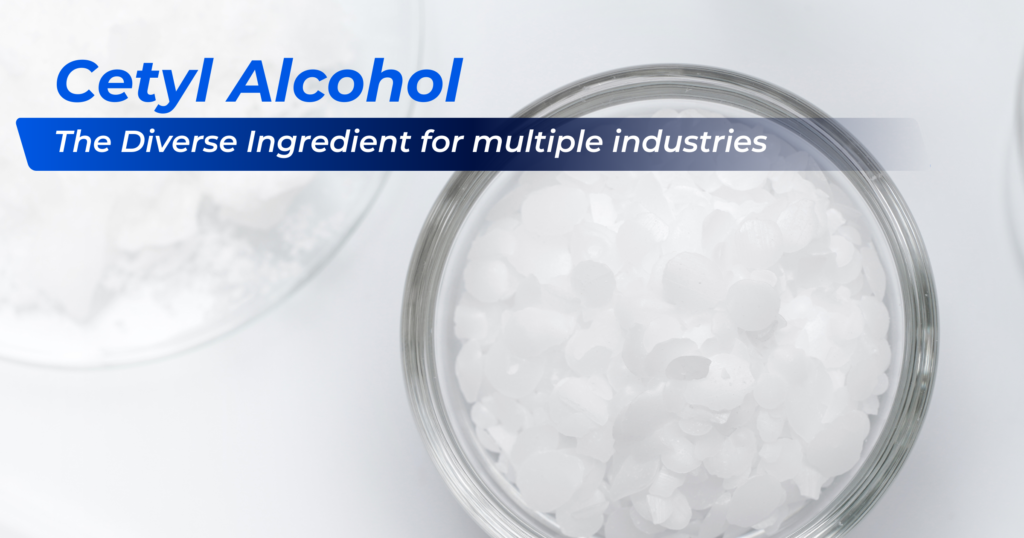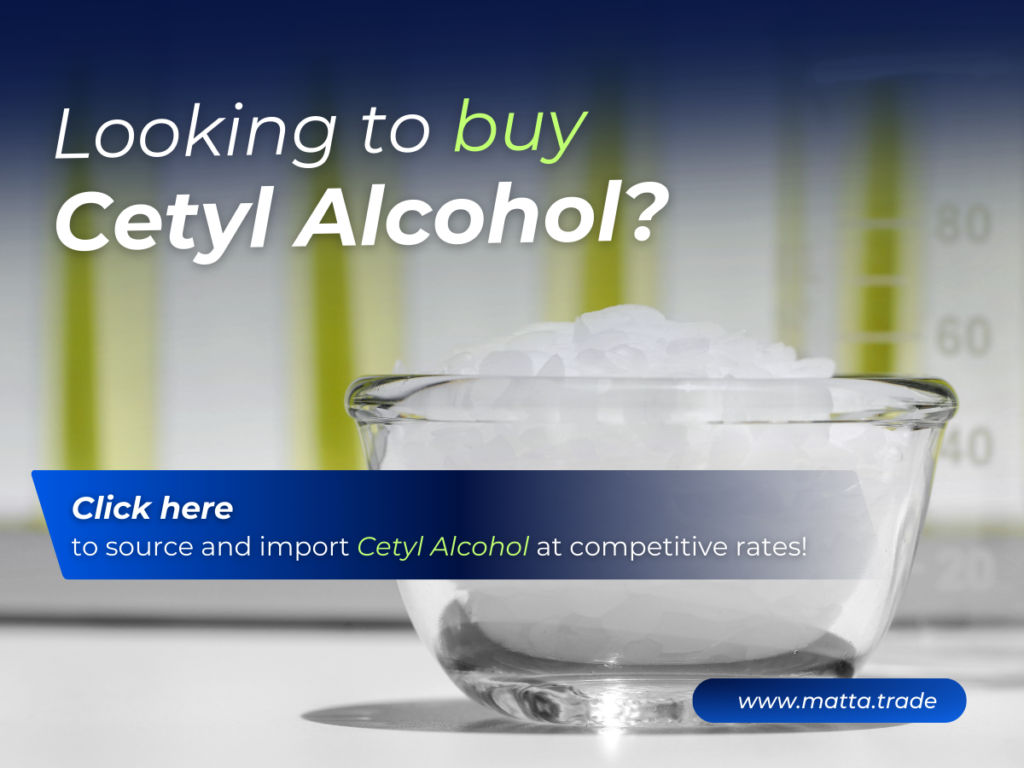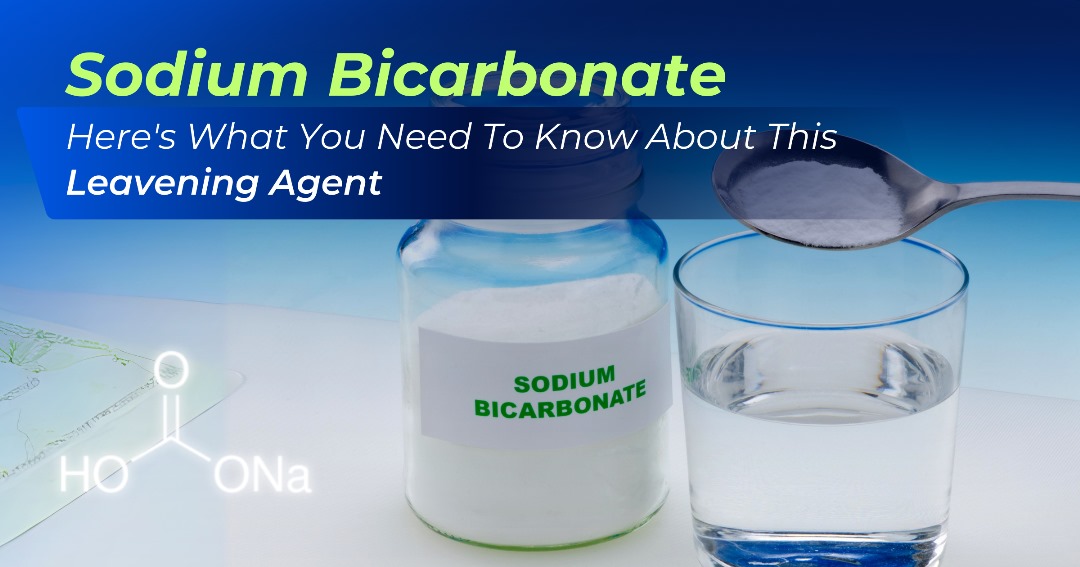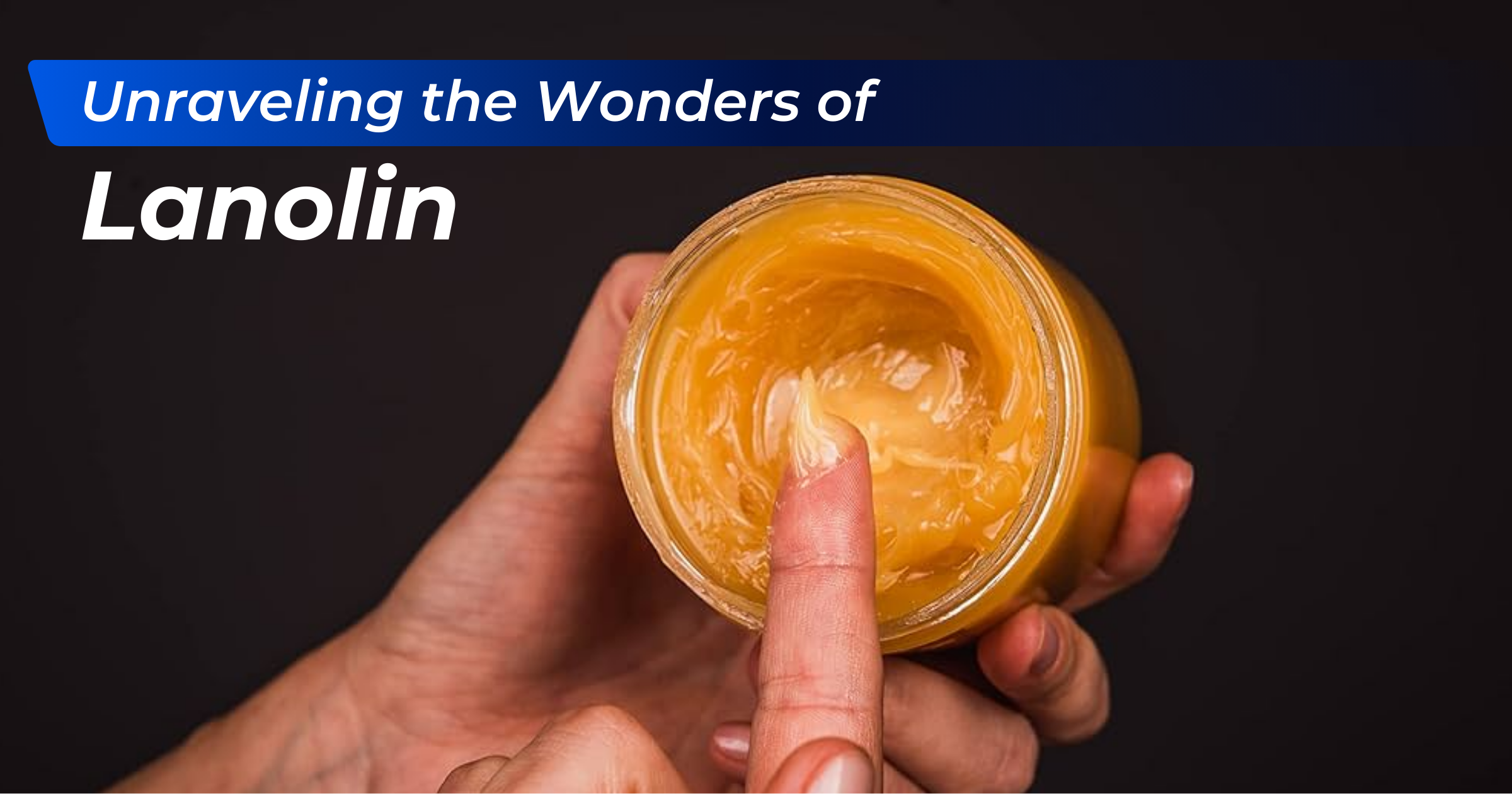
Cetyl alcohol is a versatile fatty alcohol derived from plant or animal oils, commonly found in coconut oil and palm oil. Its softening properties make it essential in cosmetics, providing moisture and softness in lotions, creams, and conditioners.
Additionally, it ensures even ingredient distribution in emulsions and aids in medications. In the food industry, Cetyl alcohol serves as a thickener and texture enhancer in products like ice cream and margarine. Its industrial applications include use as a surfactant in paints, polishes, and cleaning solutions.
With the growing demand for high-quality personal care and food products, Cetyl alcohol plays a crucial role in product innovation and quality.
READ ALSO: 5 essential facts every soda ash buyer should know
What is Cetyl Alcohol?
Cetyl alcohol, or hexadecan-1-ol or palmityl alcohol, is a fatty alcohol derive from palms and other vegetable oils. Its chemical formula is CH3(CH2)15OH.
Cetyl alcohol is manufactured through the hydrogenation of palm or coconut oils. The oils undergo hydrotreating to remove impurities, followed by catalytic hydrogenation, which converts the triglycerides in the oils to fatty alcohols. After hydrogenation, the cetyl alcohol is purified through distillation.
Lastly, Cetyl alcohol is widely use across pharmaceutical, cosmetic and food industries due to its versatility and various functional properties.
Cetyl Alcohol for Skincare Manufacturing
Cetyl alcohol is that ingredient lurking in countless skincare products. It is known for its hydrating properties and restoring skin radiance. However, in some cases, it irritates the skin, sparking redness and discomfort. So, where does the truth lie? Let’s unravel the mystery of cetyl alcohol and its impact on your skin.
Cetyl alcohol serves as a humectant, effectively attracting and retaining moisture for softer, smoother skin, particularly beneficial for dry complexions. It also enhances the skin’s natural barrier, shielding it from environmental aggressors like pollutants and harsh weather, which can help minimize irritation.
Furthermore, cetyl alcohol acts as an emulsifier, seamlessly blending oil and water to create smooth, spreadable, and non-greasy textures. Unlike some alcohols, it is non-drying and generally non-irritating, making it suitable for most skin types, including sensitive ones. However, conducting a patch test is advisable before full application.
While generally well-tolerated, cetyl alcohol can cause irritation in individuals with highly sensitive skin or conditions like eczema. Additionally, it may clog pores, potentially exacerbating acne breakouts. Thus, users should be cautious and aware of their skin’s response.
READ NOW: Introduction to Texapon
Cetyl Alcohol for Haircare manufacturing
Cetyl alcohol, derived from natural sources, offers numerous benefits to hair. Its humectant properties attract moisture, while its emulsification capabilities ensure smooth formulations. This translates to creamy conditioners, frizz-free styling, and increased volume.
However, cetyl alcohol can be a double-edged sword. While it conditions and adds volume, excessive use can lead to dryness and buildup. Its thickening properties, celebrated for volume, can also weigh down hair and dull its shine. Regular clarification is essential to prevent these issues.
Furthermore, while generally non-irritating, cetyl alcohol can cause reactions in those with sensitive scalps. Redness, itchiness, and flaking may indicate intolerance. In such cases, avoiding cetyl alcohol-containing products is crucial.
In conclusion, cetyl alcohol offers unique benefits to hair. However, it must be used judiciously and with awareness of its potential drawbacks. By understanding its properties and using it appropriately, you can harness its benefits while minimizing its risks.
Cetyl Alcohol Market Analysis
The global cetyl alcohol market was valued at USD 709.36 million in 2021 and is projected to reach USD 1,246.47 million by 2028, growing at a CAGR of 8.3% from 2022 to 2028. The market is primarily driven by increasing demand from the cosmetics and personal care industries.
Cetyl alcohol (CA) is widely used to enhance texture and viscosity in cosmetic products like creams and lotions, with its natural derivation from sources such as coconut oil aligning with the rising demand for natural ingredients. The growth of skincare, anti-aging, hair care, and color cosmetic markets drives demand.
However, supply constraints from major producers like Exploitati-On Tulipe and Rita Corporation, coupled with increased prices (from USD 2,510/ton in 2019 to USD 3,060/ton in 2022), are attracting new entrants and investments to balance demand-supply dynamics in mature markets across Europe, North America, China, Japan, and Southeast Asia.
READ NOW: The SME guide to sourcing skincare ingredients smartly
Cetyl Alcohol in Africa
South Africa and Nigeria are the leading producers of CA in Africa, accounting for over 50% of the continent’s total output. Egypt, Algeria, Morocco and Kenya are other significant producers. Local consumption is also high in these countries, driven by personal care, cosmetics, pharmaceuticals and chemical industries, and the abundant availability of raw materials like palm and coconut oil.
Trends and statistics
Africa’s cetyl alcohol market is projected to grow at a CAGR of 5.2% from 2022 to 2027, higher than the global average. Companies like BASF, Sasol, and Musim Mas will drive this growth by establishing new production facilities. Rising incomes and demand for cosmetics/personal care should further increase consumption.
Growth opportunities
There is significant potential for import substitution of CA in Africa. Over 30% of demand is met by imports from Asia and Europe. Local players can target this import replacement, especially in emerging markets like Ethiopia, Tanzania, and Ghana, where demand is rising rapidly. Africa’s changing demographics with a young, fashion-conscious population will also support the long-term growth of its consumption across personal care and cosmetics industries.
Buy Cetyl Alcohol Online With Matta
Africa’s cosmetics and pharmaceutical industries are experiencing unprecedented growth, driving demand for high-quality ingredients like cetyl alcohol. Traditional procurement methods are rapidly giving way to more efficient solutions. Today’s innovative manufacturers embrace digital procurement, and Matta is at the forefront of this revolution.
As Africa’s leading chemtech platform, Matta’s B2B digital marketplace bridges the gap between manufacturers and verified suppliers of premium cetyl alcohol and countless other essential chemicals. This innovative marketplace transforms the procurement experience, allowing businesses to:
- Access pharmaceutical-grade cetyl alcohol from certified global suppliers with full traceability
- Navigate purchases effortlessly through a streamlined digital interface
- Benefit from Matta’s stringent quality verification protocols
- Build resilient supply chains that support business growth
Modernising procurement processes is advantageous for forward-thinking cosmetics, pharmaceuticals, and personal care businesses.
Ready to transform how you source cetyl alcohol?
Join the continent’s most trusted chemical marketplace today and experience procurement reimagined. Sign up on Matta and elevate how you source the ingredients that define your product quality.





